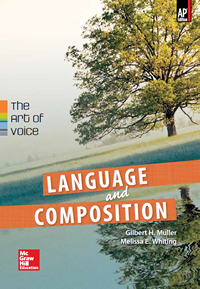
Language and Composition: The Art of Voice (Muller and Whiting)Chapter 8: Government, Politics, & Social Justice: How Do We Decide What Is Fair?Chapter OverviewAs you read the essays in this chapter, consider the following questions:
Recent studies indicate that American students have an extremely limited understanding of government and politics. In fact, one-third of all high school juniors cannot identify the main purpose of the Declaration of Independence or say in which century it was signed. This document is one of the selections in this chapter. If we are ignorant of such a basic instrument in the making of our history and society, what might that say about our concepts of citizenship? Do we now see ourselves purely as economic units—in terms of our ability or potential to make money—or as consumers—in terms of the roles we play in spending it? Other notable essays on government, politics, and social justice in this chapter will help us understand our cultural legacies and what has traditionally been thought of as the impetus in developing America as a country. Skilled writers can bring politics and issues of social justice to life, enabling us to develop a sense of the various processes that have influenced the development of cultures over time. By studying the course of history and politics, we develop causal notions of how events are interrelated and how traditions have evolved. The study of history and politics can be an antidote to the continuous “present tense” of the media, which often have the power to make us believe we live from moment to moment, discouraging reflection on serious issues such as why we live the way we do and how we came to be the people we are. Essays, speeches, documents, biographies, narratives, and many other literary forms capture events and illuminate the past while holding up a mirror to the present. Our political story can be brought to life out of the plain but painfully eloquent artifacts of oral culture. Yet Thomas Jefferson employs classical rhetorical structures—notably argumentation—in outlining democratic vistas in the Declaration of Independence. Even the briefest reflection will remind us of how important political processes and institutions are. Put simply, a historical understanding of government, politics, and our quest for social justice validates our memory, a remembrance of how important the past is to our current existence. When, for example, Martin Luther King, Jr., approaches the subject of oppression from a theological perspective, we are reminded of how important the concept of freedom is to our heritage and the various ways it can be addressed. Indeed, had we been more familiar with chapters in human history, we might have avoided some of the commensurate responses to the crises in our own era. The essays in this chapter help remind us—as the philosopher Santayana warned—that “those who forget the lessons of history are doomed to repeat them.” Only with a valued understanding of the motivations of government and politics can we make informed choices. Through a study of government and politics, we learn about challenges and opportunities, conflicts and their resolutions, and the use and abuse of power across time in numerous cultures and civilizations. It is through the study of historical processes and political institutions that we seek to define ourselves and to learn how we have evolved. |  |















